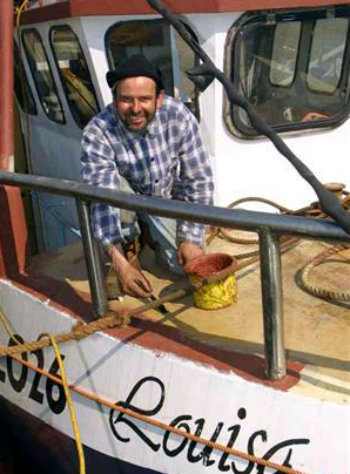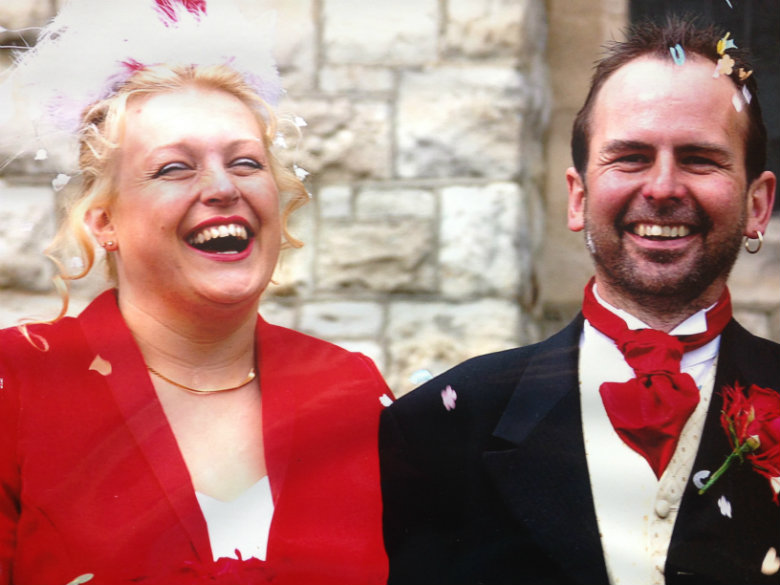An uplifting voice
Jane Dolby, founder of the Fishwives Choir, writes about the loss of her husband in Song of the Sea, a moving memoir of bereavement and triumph published this week. Rachel Walker talks to her about finding her voice and telling her inspiring story.
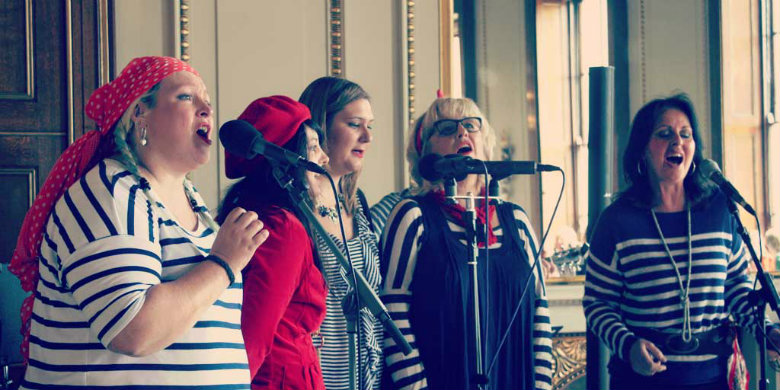
I first met Jane Dolby almost exactly one year ago. It was a bright spring morning at Fishmonger’s Hall and the staff were busily preparing for a formal lunch. I heard Jane and her group, the Fishwives Choir, before I met them, their big voices filling the lofty entrance hall and rebounding down the polished corridors.
Later that day, dressed in blue-and-white Breton stripes, the choir performed a series of shanty songs for the lunchtime guests. But despite the foot-stamping and upbeat tempo, many of the lyrics were laced with sadness – not least their folk version of Eternal Father: Oh, hear us when we cry to Thee For those in peril on the sea. These words are rich in meaning for the Fishwives Choir, which has numbered as many as 40 women, all related to UK fishermen or from fishing families, and many of whom have lost a loved one at sea – a stark reminder that fishing remains the most dangerous job in peacetime.
Eternal Father was played at Jane’s wedding when she married Colin, a sixth-generation trawlerman. Tragically, it was played again at his funeral, just a few years later. Jane’s life since that traumatic time has been wrought with stomach-churning lows. But there have been enormous highs too thanks to the Fishwives Choir, which she founded in order to raise money for the Fishermen’s Mission –the only charity in Britain that works exclusively with fishermen and their families to provide emergency support alongside practical, financial, spiritual and emotional care.
In the year since I first met Jane, she has penned a memoir, Song of the Sea, which has the dual aim of continuing to raise awareness of the Fishermen’s Mission’s work, and also attempting to provide solace to anyone else who is dealing with bereavement. “After Colin died, I read several books by people who had lost their partners,” says Jane. “I really held on to their words about coming through it eventually. At the time, I didn’t think I’d ever recover, but the books offered me hope. Perhaps my story will offer others beginning this hideous journey some hope too.
Writing Song of the Sea was itself cathartic. “I had to remember the days when I first met Colin and we began our relationship. It was both beautiful and agonising as it caused me to fall in love all over again. Sometimes it was terribly hard to tear myself away from the pages and back to the reality of Colin not being here.”
That comes through powerfully in the book. The first part is essentially a love story, which begins when Jane moved next door to Colin in Leigh-on-Sea. She was in her mid-30s then, with two young boys and one marriage behind her. She was also a vegetarian with no knowledge of fishing whatsoever. “Despite growing up on the Essex coast, fishing was all new to me. I didn’t know any fishermen and I’d never even considered going out on a fishing boat.”
Colin on the other hand was a fisherman born and bred, who embraced the solitary days aboard his 40-foot trawler Louisa. He’d always fished in the Thames Estuary round Southend, sometimes travelling 20 miles up the coast to Clacton or heading east to the edge of the North Sea. Jane describes him as straightforward; a man who lived in the moment and somewhat apart from the modern world, who had never even used an ATM.
It certainly wasn’t love at first sight. “With his scruffy clothes, a black woolly hat and smelling of fish, he just wasn’t my type,” she laughs. But then there was the time that Colin made Jane’s two boys some goalposts, and the time that he popped over with a bag of Dover sole. “I’d never cooked Dover sole before. But I learned to bake it in tin foil with butter, salt and pepper, and a little white wine. The fish had such beautiful flavour it never needed much.”
Jane became intrigued enough to spend a day at sea with Colin. “Once we’d climbed abroad, he was a different person,” she says. “He moved about the boat, pulling ropes and moving kit. It was like seeing a cumbersome old seal, shuffling about on land, suddenly flashing about in the water, a creature of grace and power. I saw a side to him that I didn’t see in everyday life on land.”
“The blossom is on the trees, so the soles are back in the river,” Colin told her, as they set out that morning – and she knew then that, one day, she would marry him. And in due course, 18 months after they had their first child, Amelia, together, she did. A second child, Liam, followed. She describes the wheels of family life contentedly chugging away over the next few years until – one day just before Christmas and a week before Amelia’s eighth birthday – everything changed.
Jane remembers buying presents online that morning, while Colin had gone out “weeding” – a common activity for fishermen in scarce winter months that involves raking the seabed for seaferns, used to decorate aquariums. A storm came out of nowhere, whipping tiles off the roof of Jane’s house. It was much worse out at sea, with force eight winds. In the early afternoon, at 13:02 to be precise, the Met Office recorded a powerful gust – and that’s when Colin’s trawler disappeared off the radar. It had capsized and sunk, and when it was dredged up three days later, there was no sign of Colin. It was a year until his body was finally found.
The chapters that follow are understandably full of grief, but there’s much anger too about the bureaucracy surrounding a body lost at sea. No death certificate can be issued, which means that no bank or phone mobile accounts can be closed. Jane quickly became inundated with penalty charges from banks as direct debits bounced.
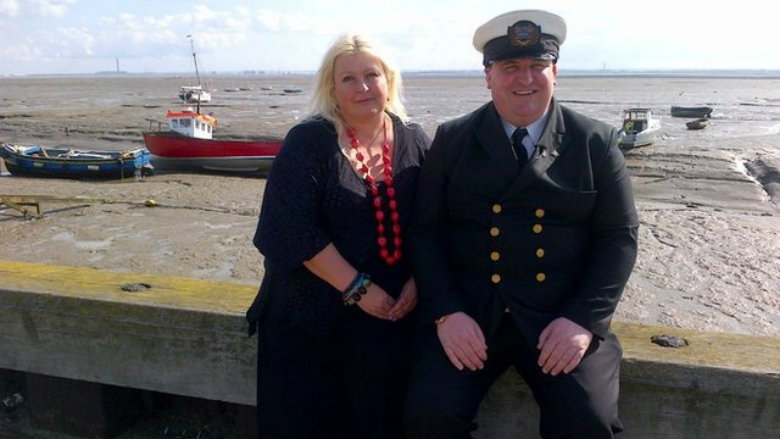
But through all this pain, a figure stands solidly in the background: Tim Jenkins from the Fisherman’s Mission. He first appeared within 48 hours of Colin’s death. Jane describes coming downstairs to find a “burly bloke” sitting in her living room. He had arrived among the flow of family and friends coming and going, and explained that his job was to support families in hardship. “From that point on, he didn’t really leave my side.”
From the little things, like taking Jane to the doctor’s surgery, to praying down the phone with her during the darkest days and helping get her finances back on track, Tim and the Fishermen’s Mission came to the Dolby family’s rescue. “I knew that we could have lost everything – we could have been homeless – had it not been for the people who helped us,” says Jane. She promised that she would repay them one day.
And so Jane’s memoir enters its final part, with the simple ambition of paying back a charity for its kindness and generosity. But it quickly becomes much more. The founding of the Fishwives Choir is an inspiring story of human resilience, sisterhood and community, and the uplifting power of song. “Singing is such an unexpected gift to come out of something that was so terrible. Especially when I thought I’d never be happy or look forward to anything again.”
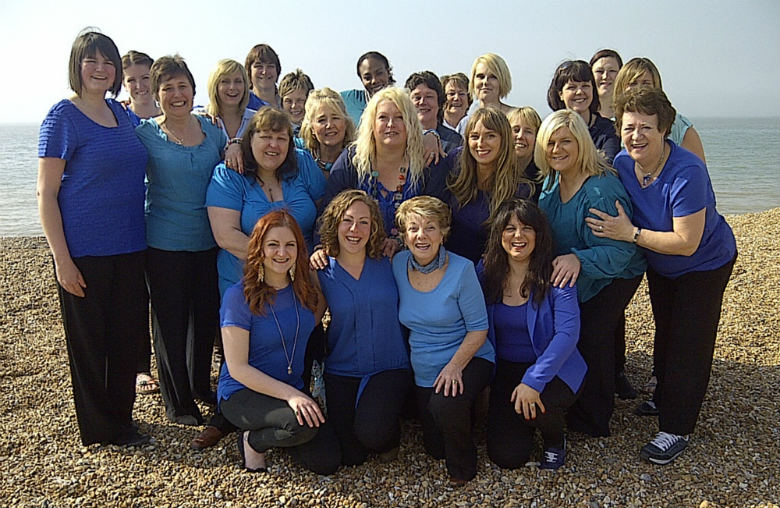
Song of the Sea is written with great honesty. It’s a story that brings home the very real dangers of being a fisherman in the 21st century, and the consequences it has for families when things go wrong at sea. “A friend once put it in a way that really stuck in my mind, that the story of fishing is like an untold war. And, as in war, those left behind tend to be women – and women aren’t traditionally heard in maritime history.” Jane may be one of the unlucky ones left behind. But she has found her voice – both in song and through this powerful and touching memoir.
Song of the Sea, by Jane Dolby, Amazon (£6.39). For more on the Fishwives Choir, visit www.fishwiveschoir.co.uk. For more on the work of the Fishermen’s Mission, visit: www.fishermensmission.org.uk.


